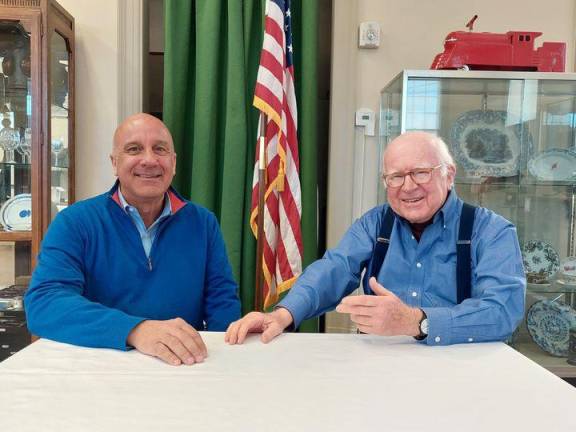
Hackles were raised peacefully at a recent First Amendment discussion by two of Warwick’s prominent legal and historical scholars, Prof Richard Hull, Town of Warwick Historian, and Robert Krahulik, Esq., principal at the Law Firm of Beattie and Krahulik, one of the community’’s oldest law firms, founded in 1872.
A standing room only crowd of more than 50 people exchanged comments during the 90 minute presentation, in which Hull and Krahulik set the stage for the First Amendment, one of the pillars of the Bill of Rights. Krahulik began by simply reading the statute’s language: “Congress shall make no law respecting an establishment of religion, or prohibiting the free exercise thereof; or abridging the freedom of speech, or of the press; or the right of the people peaceably to assemble, and to petition the Government for a redress of grievances.”
“The critical component to that Amendment,” according to Krahulik, “was in the very first part that states ‘Congress shall make no law.” This spurred a vigorous exchange with the audience, which remained respectful throughout the evening, despite some of the emotional ingredients that have been debated by the US Supreme Court. Prof. Hull added that “no case before the U.S. Supreme Court during its 2017 received more attention or stimulated more discussion than Masterpiece Cakeshop Ltd. v. Colorado Civil Rights Commission.” The American Bar Association reported that the underlying issue was profoundly significant: Does a business have a constitutional right to discriminate based on its owner’s beliefs?
Many audience participants voiced their opinion about the case of Charlie Craig and David Mullins, who had married in Massachusetts but wanted to celebrate their wedding in Colorado where they lived. But the baker they chose, Jack Phillips, refused because he believed that their union violated his religious beliefs. The couple eventually filed a discrimination complaint against Masterpiece Cakeshop and Phillips in September 2012, shortly after the couple’s visit to the shop. The Colorado Civil Rights Division found probable cause that Phillips violated the Act and referred the case to the state’s Civil Rights Commission, but the case wound up in before the Supreme Court five years later, which ruled in favor of Phillips.
By the time the discussion was about to turn to other aspects of the first Amendment, time ran out, leaving most of the attendees wanting more from the presenters, who invited audience members to submit questions to them for what is expected to be another session about the amendments to the Constitution. For more information about upcoming events at the Warwick Historical Society, click on WarwickHistory.org.
Krahulik began by simply reading the statute’s language: “Congress shall make no law respecting an establishment of religion, or prohibiting the free exercise thereof; or abridging the freedom of speech, or of the press; or the right of the people peaceably to assemble, and to petition the Government for a redress of grievances.”